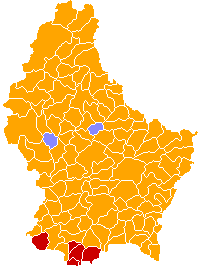Luxembourgian legislative election, 2004
|
|
|||||||||||||||||||||||||||||||||||||||||||||||||||
|
|||||||||||||||||||||||||||||||||||||||||||||||||||
|
|||||||||||||||||||||||||||||||||||||||||||||||||||
|
|
|||||||||||||||||||||||||||||||||||||||||||||||||||
|
Results:
CSV
LSAP
DP
|
|||||||||||||||||||||||||||||||||||||||||||||||||||
|
|||||||||||||||||||||||||||||||||||||||||||||||||||
General elections were held in Luxembourg on 13 June 2004, alongside European Parliament elections. The ruling Christian Social People's Party (CSV) of Prime Minister Jean-Claude Juncker won the election, increasing its number of seats to its highest since before 1989 and its share of the vote to levels not seen since the 1959 election.
As expected, the CSV won a plurality of seats, adding 5 new deputies, and continued as the majority partner in the coalition government. However, the junior partner changed from the liberal Democratic Party (DP), which lost 5 seats, to the Luxembourg Socialist Workers' Party (LSAP), which gained one seat. the Greens also slightly increased their representation, whilst the Alternative Democratic Reform Party (ADR) lost ground.
The election coincided with the 2004 European Parliament election.
...
Wikipedia




